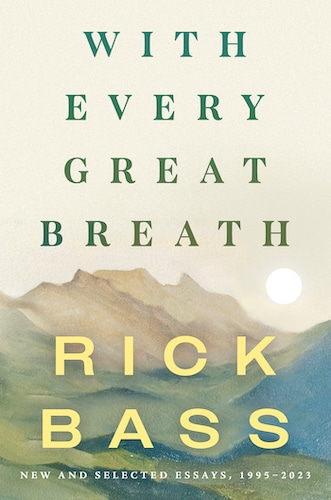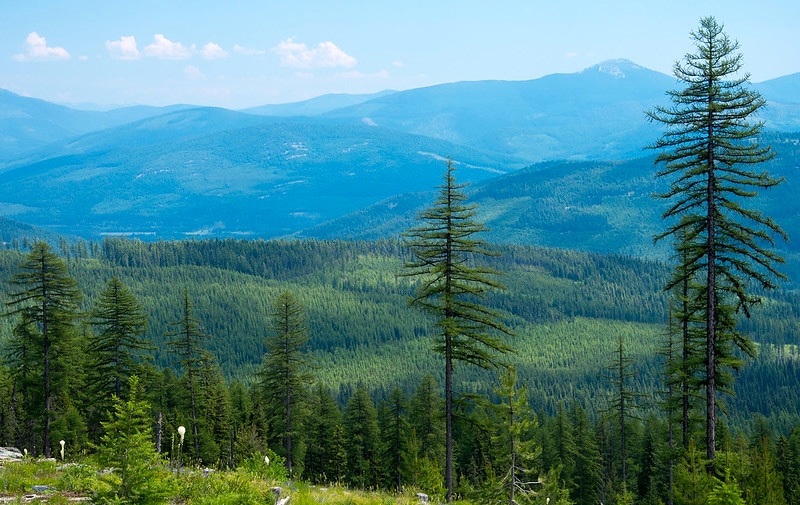
Rick Bass is an American author of more than thirty books, both fiction and non-fiction, on a wide range of topics. An environmental activist, he is also an artist drawn to the beauty of the natural world. The winner of numerous awards, his most recent essay collection, With Every Great Breath, was released this February by Counterpoint Press and includes three new essays along with a selection of eighteen written over nearly three decades.

Counterpoint Press
Bass is based in the Yaak Valley in Montana. “It’s a land of extremes and superlatives,” he says. Through the Yaak Valley Forest Council, Bass and a group of locals work to preserve the valley from logging, and are also trying to convince the U.S. Forest Service to reroute the Pacific Northwest Trail away from grizzly bear habitat, of which there are only 25 remaining in the Yaak. He’s also involved in a campaign to make the Yaak a climate refuge. The following are excerpts from a conversation with him from his home in Montana, as he was making a chili dinner.
What makes the Yaak Valley special?
Its uniqueness, its singularity, is its duality, essentially a paradox. It’s two things – the major ecosystem driver is rocks, and yet because we’re at the edge of the Rocky Mountains, a major landscape driver is also fire. There is an extraordinary amount of biological diversity here. Twenty-five percent of the state of Montana’s list of sensitive species are found in this one national forest a long way up in the northwest corner. It’s the wettest place in Montana, it’s the lowest elevation, it’s the northernmost.
Why should the Yaak Valley be considered a climate refuge? (Bass recently wrote about this here.)
It’s a place to preserve this incredible habitat and diversity to buy some time and try to slow the rate of climate change. That’s where the advocacy for the old forests comes in. Historically, the Yaak was as much as 50 percent old growth, and now there’s only about 10 percent old growth. Old growth is an incredible mechanism for storing carbon for long-term safe keeping. The climate refuge would be an experiment in what that would look like – how would you go about returning the landscape to its historic range of variability of old and mature forest.

The Yaak Valley from Garver Mountain, Kootenai National Forest, on July 9, 2012. U.S. Forest Service Pacific Northwest Region
Where does that campaign stand right now?
All campaigns take a long time, but we’re proceeding at the local, state and national level. Everybody we talk to is enthused about the idea, but you know, government takes a good while to enact it. There’s about a hundred million acres of old and mature forests on public land around the U.S., so our quarter-million acre proposal is pretty small.
How do you look at activism now, not only for you but for others, as opposed to 20, 30, 40 years ago?
With the passage of time, as populations grow and resource pressures accrue, it gets harder and harder to feel that one person can make a difference, or that even a group of people can make a difference. As an activist and as an artist, it’s really important for me to try to find means and mechanisms for which people can feel engaged. There’s a lot of donor fatigue out there. It might take more creativity to become a successful advocate now than in the past. That’s my experience, anyways.
The title piece is about the past and the future of pollutants and activism. (The essay discusses the devastating health impact of the mining of vermiculite from Montana.) Where are we headed? Are pollutants getting worse, are the problems getting worse?
When I started working on that, it was hyper-specific and intensely local. One of the least populated parts of western Montana, one of the largest geographic areas and counties in the state of Montana. Again, I guess a common theme was out of sight from the public eye. The elimination of truth that reporting can bring to any issue. Anybody who’s got their head out of the sand and is looking around at the world is, I think, aware of the good and evil battle between the two major political parties in this country, trying to determine whether those things be regulated and accounted and monitored, or not, and it is, along with climate change, the battle of our time.
You write in a new essay, “Who knows how we come to things?” Would you say that you come to things by looking out the window?
When I’m writing, I am looking out the window, but when I’m writing I am engaging with my experience with the five senses, the physical world and my experience in it. I’m really fortunate to live here in such a singular landscape, where a lot of those experiences are singular, so it’s a great place to be a thinker as well as an activist.
You worked as an oil and gas geologist in Mississippi before moving west. When you first moved from those areas to Montana, were you struck by that part of the world?
I did not move to Montana intending to tell people what Montana was like. I moved to Montana because I missed the west. After that first year in the valley in 1987, I realized what was being lost, and the rate it was being lost, and the violence with which it was being lost. And I thought, I’ll stop writing fiction for a little while and I’ll spend some time writing about what’s going on out here. It’s been 37 years.
You’ve written about dogs, caribou, rhinos. What about animals appeals to you as a writer and a person living in the world?
What impresses me about animals, whether domesticated or undomesticated, is the degree of their fittedness to the world. They’ve been here a lot longer than our own species, and they have learned to accommodate with power and grace, the world. And we are still working at it. I am never around them without experiencing amazement, admiration, respect. We have a long way to go. We just got here.
What about the Anthropocene? What is your thought on that?
We have just arrived here. Rather than learning to fit the world and integrate gracefully and with connection to all of the rest of the world, we seem to have skated past that step in development, and are simply attempting to shape it to our desires without the deep engagement of knowledge. And the consequences are writ large in the script of misery.
What do you think the final extraction might look like? When the final drop of oil, or the final piece of coal is taken out of the ground? What would that moment be like?
There’s a line that comes to mind from Peter Matthiessen in his first book of his trilogy, about a poacher in the Everglades. A client was asking where he could procure some rare feather… The poacher studied on it and answered with some regret, Well, I believe all of those pretty little birds have done flown away. I think that would be the response to the last barrel of oil or last turn of coal taken. I believe it’s all gone away. You know, with absolute lack of ownership in the leave-taking.
The post ‘We Have Just Arrived’: Author Rick Bass on Writing and Activism in Montana appeared first on EcoWatch.
